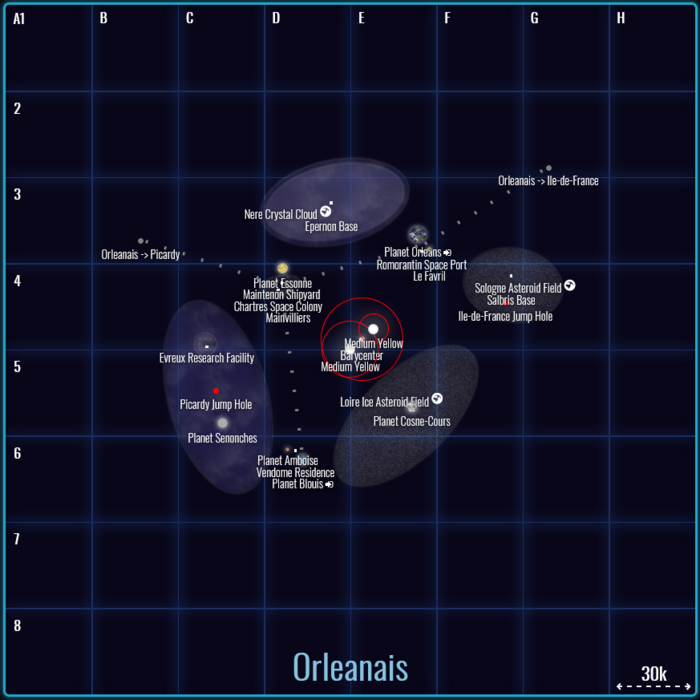
|
This wiki is closed in favour of the new wiki. Information shown is likely to be very out of date. |
Orleanais
| Orleanais | |
| System | |
| Governing House | |
| Region | Gallia |
| Connected Systems |
Ile-de-France Picardy |
Orleanais was the second system of Gallia that was settled. It is part of the Gallic core worlds and very loyal to the gallic crown. Planet Orleans is very well planet for plants. Some people call Orleanais the Kyushu of Gallia because it feeds most other Gallic Core worlds, but it also holds large parts of valueable metals like Nickel or Yittrium.
System Overview
|
Astronomical Bodies
Stellar Objects
Medium Yellow
Medium Yellow
|
Industrial Development
|
Faction Presence
Lawful Factions
Corporations & Guilds
Unlawful Factions
|
System Map
| Spoiler: Navmap 4.91 |
|---|
 |
Areas of Interest
Nebulae
Nere Crystal Cloud
Nere is a medium-sized nebula consisting mostly of ice particles. The same type of minerals are present in the Loire field, but in far smaller concentrations. Gallic astronomers consider the increased crystal density in Nere to be the result of anomalous gravitational activity thousands of years ago.
Eure Nebula
Eure is a bright blue nebula located on the edge of the Orleans system. Several gas miners usually operate within the field and extract inert gases, with the nearby Chateaudin facility available to process and ship those. The name originally belonged to a French river and department which was located in the ancient provence of Normandy. Therefore, Normandy colonists considered naming of the nebula inappropriate and petitioned to rename it in order to use the name for a nebula in the Normandy system. The petition was declined, and the Normandy nebula in question is still named "Nebula N03C14 (Eure)" on official Gallic nav maps. After the First Gallic War the separatists use their own navigation maps on which Eure in Orleans is named Loir Nebula.
Asteroid Fields
Loire Ice Asteroid Field
Loire field was once counted to contain approximately 5 x 10e9 more water than River Loire on Planet Earth carried during five thousand years. This ice field is one of the largest in Sirius outside the Barrier region, and the largest one in Gallia, with Somme Field in Picardy coming a close second. Ice asteroids in the field are very large, but the spaces between them are equally vast, making the field relatively easy to navigate. In a more remote part of the field, pilots may find a jump hole route into the Auvergne system.
Sologne Asteroid Field
Named after a large marsh region of northern-central France, Sologne is a large asteroid field in the Orleanais system. The pirate presence in the field is among the highest in the Gallic Core Worlds, and a base belonging to Brigands is supposedly located in one of the central asteroids. The field is known for its high asteroid density and is rumored to contain a mystical base where romantic dreams of gallant travellers may come true. Few who attempted to find whatever romance the field contains usually arrived to Salbris to find an environment much less romantic (albeit full of people willing to fulfil various sorts of semi-romantic dreams for a fair payment), or ended up crashing into an asteroid or into a mine. An old mine field is present near the edge of the field, but its exact origin or purposes remain unknown.
Jump Gates/Holes
| Spoiler: Jump Hole/Gate Locations | |||||||||||||||
|---|---|---|---|---|---|---|---|---|---|---|---|---|---|---|---|
|

